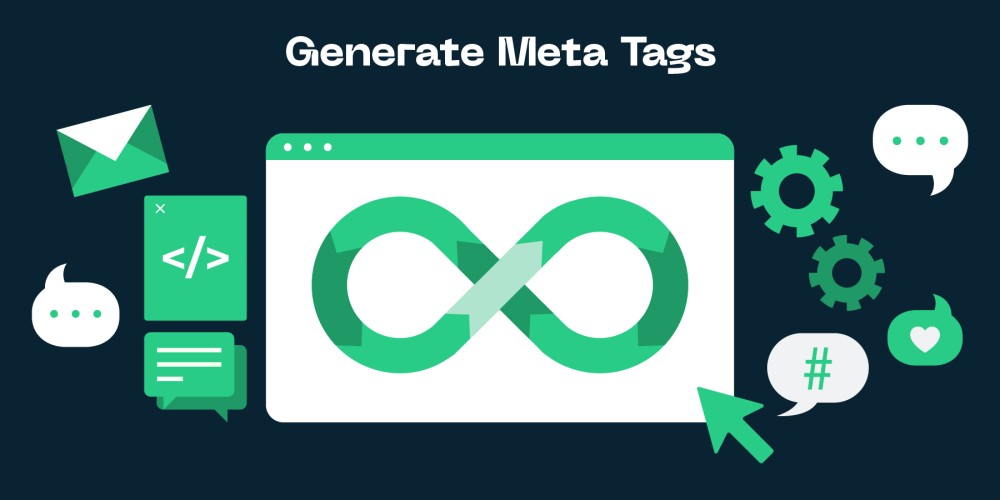Best Meta Tags for SEO: How to Generate and Optimize Meta Tags

Key Takeaways
- Meta tags directly impact both SEO rankings and click-through rates. Optimizing them is essential for visibility and user engagement in 2025.
- Focus on five critical meta tags: title tags, meta descriptions, meta robots tags, social media tags (Open Graph, Twitter Cards), and viewport tags.
- Best practices matter: frontload keywords, stick to character limits, write action-driven descriptions, ensure uniqueness, and optimize for mobile.
- Tools like ConvertMate streamline meta tag creation and optimization, scaling SEO success without increasing manual workload.
Meta tags may not be visible to users, but they shape nearly everything about how your website performs in search results.
They’re the silent signals that tell search engines what your page is about — and just as importantly, they’re the first thing users see before they decide to click.
In 2025, meta tags remain one of the fastest, highest-leverage ways to influence both SEO rankings and user engagement. Yet, many brands still treat them as an afterthought — missing critical opportunities for growth.
This guide breaks down the meta tags that matter most, how to generate them correctly, and how to optimize them for maximum visibility and performance. If you're serious about staying competitive in search, these are the tactics and tools you can't afford to overlook.
What Are Meta Tags and Why They Matter
Meta tags are short snippets of code embedded in your website’s HTML. They provide structured information about your page’s content to search engines — and a preview of that content to users.
Done right, meta tags deliver a two-fold advantage:
- Better Search Engine Indexing: They help Google and other search engines understand and categorize your pages, improving your chances of ranking for the right queries.
- Higher Click-Through Rates (CTR): Strong meta titles and descriptions make your pages more attractive in search results, driving more organic traffic without increasing ad spend.
In today’s hyper-competitive landscape, optimizing meta tags isn’t optional — it’s foundational to scaling organic growth.
5 Types of Meta Tags You Need to Know
Understanding which meta tags move the needle — and how to leverage them — is critical to building a strong SEO foundation in 2025. Here are the essentials:
Title Tag
Your title tag is the single most important meta element for SEO. It acts as your page’s headline in search results — influencing both how search engines rank you and whether users choose to click.
A strong title tag balances keyword relevance with clarity and clickability, all within the ideal character limit (under 60 characters).
Meta Description
While meta descriptions don’t directly impact rankings, they heavily influence user behavior. A well-crafted description serves as your sales pitch, summarizing the page and compelling users to visit.
Clear, action-driven descriptions can dramatically lift your click-through rate — making every ranking position work harder for you.
Meta Robots Tag
The meta robots tag gives you control over how search engines interact with your pages.
You can signal whether a page should be indexed, followed, or excluded from search results entirely — critical for managing duplicate content, privacy-sensitive pages, or strategic redirects.
Social Media Tags (Open Graph, Twitter Cards)
Open Graph (for Facebook, LinkedIn) and Twitter Card tags determine how your pages appear when shared on social media.
Optimizing these ensures your content looks professional, polished, and clickable — maintaining brand control across every channel where your audience discovers you.
Viewport Tag
The viewport tag tells browsers how to render your page on different devices, ensuring mobile users have a smooth, responsive experience.
Without it, your pages can load poorly on smartphones — damaging user engagement and hurting your rankings in Google's mobile-first index.
Optimization Best Practices for Meta Tags
Creating meta tags isn’t enough — optimization is what separates high-performing pages from those that get buried.
Focus on these best practices to maximize both visibility and clicks:
Front-load Critical Keywords
Place your most important keywords as close to the beginning of your title tag and meta description as possible. Early keyword placement strengthens relevance signals for search engines and grabs attention faster in search results.
Stick to Ideal Character Counts
Keep title tags under 60 characters and meta descriptions under 160 characters. This ensures your tags display fully on both desktop and mobile — without awkward cut-offs that weaken your messaging.
Write Action-Driven, Emotionally Engaging Descriptions
Your meta description is prime real estate. Use it to trigger curiosity, urgency, or emotional connection — and include a clear call-to-action.
Pages that speak directly to user intent drive significantly higher click-through rates.
Ensure Uniqueness Across Pages
Duplicate meta tags confuse search engines and dilute your visibility. Each page must have a unique title and description, tailored to its specific content and keywords.
Always Optimize for Mobile
With mobile devices accounting for the majority of searches, every meta tag must be crafted with mobile displays in mind.
Concise, impactful language and mobile-responsive viewport tags are now baseline requirements for competitive SEO.
Common Mistakes That Can Hurt Your SEO
Even with the right strategy, a few simple missteps can undermine your entire SEO effort.
Avoid these common pitfalls:
Keyword Stuffing
Overloading your meta tags with keywords signals spam to both search engines and users.
Focus on natural, relevant phrasing — one or two primary keywords placed strategically will outperform keyword-packed titles every time.
Duplicate Meta Tags Across Pages
Recycling the same title or description across multiple pages confuses search engines about which page to prioritize. Each page must have its own unique, targeted meta tags to maximize visibility and avoid cannibalizing your rankings.
Ignoring Mobile Responsiveness
With mobile-first indexing now the norm, failure to optimize meta tags (and include viewport settings) can cripple your performance on mobile searches. Always create meta tags with mobile display and engagement in mind.
Recommended Free Meta Tag Generators
ConvertMate
Purpose-built for Shopify and ecommerce brands, ConvertMate offers two specialized tools:
- Meta Title Generator: Optimizes titles for rankings and clicks.
- Meta Description Generator: Crafts high-converting summaries tailored for improved click-through-rates.
Both are fully automated and designed to scale across large product catalogs effortlessly.
MetaTags.io
A user-friendly platform that lets you preview and generate meta tags for websites, Open Graph, and Twitter Cards — ensuring your pages look polished across every channel.
Seo Book.com
Provides simple but powerful tools for checking character counts, word counts, and optimizing meta tags to meet current search engine display standards.
Frequently Asked Questions
1. What are meta tags in SEO?
Meta tags are HTML elements that provide information about a webpage to search engines and users, influencing how the page is indexed and displayed in search results.
2. Which meta tags are most important for SEO in 2025?
The most critical tags include the title tag, meta description, meta robots tag, social media tags (Open Graph, Twitter Cards), and viewport tag for mobile optimization.
3. Do meta descriptions affect Google rankings?
While meta descriptions do not directly influence rankings, they significantly impact click-through rates, which can indirectly affect SEO performance.
4. How long should my title tag and meta description be?
Aim for under 60 characters for title tags and under 160 characters for meta descriptions to ensure full visibility across desktop and mobile devices.
5. Can I automate meta tag creation for a large ecommerce site?
Yes. Platforms like ConvertMate automate meta tag generation and optimization across large product catalogs, saving time and improving consistency.
6. What happens if I use duplicate meta tags across multiple pages?
Duplicate meta tags confuse search engines about which page to rank, reducing your site's visibility and diluting search authority.
7. Why is mobile optimization important for meta tags?
With mobile-first indexing now the standard, ensuring meta tags display properly on mobile devices is critical for search rankings and user experience.
8. Are meta keywords still relevant for SEO?
No. Meta keywords are ignored by major search engines like Google and Bing and no longer contribute to SEO performance.
Summary
Meta tags aren't just a box to check for SEO — they’re a powerful growth lever.
Done right, they directly influence how search engines rank your pages and how users engage with your brand in search results.
Great meta tags mean:
- Higher rankings,
- Better click-through rates,
- Stronger brand credibility across every digital touchpoint.
To compete in today’s landscape, brands must move beyond outdated tactics and prioritize automation, optimization, and strategic execution.
Meta tags may be small — but their impact on your growth trajectory is massive.
If you're ready to stop guessing and start scaling, ConvertMate can help.
Our platform automates meta tag creation and optimization across your entire site — turning SEO enrichment and conversion lift into a hands-free process.
Try ConvertMate free for 7 days today to see how leading brands are building faster, stronger, and smarter search visibility — automatically.



